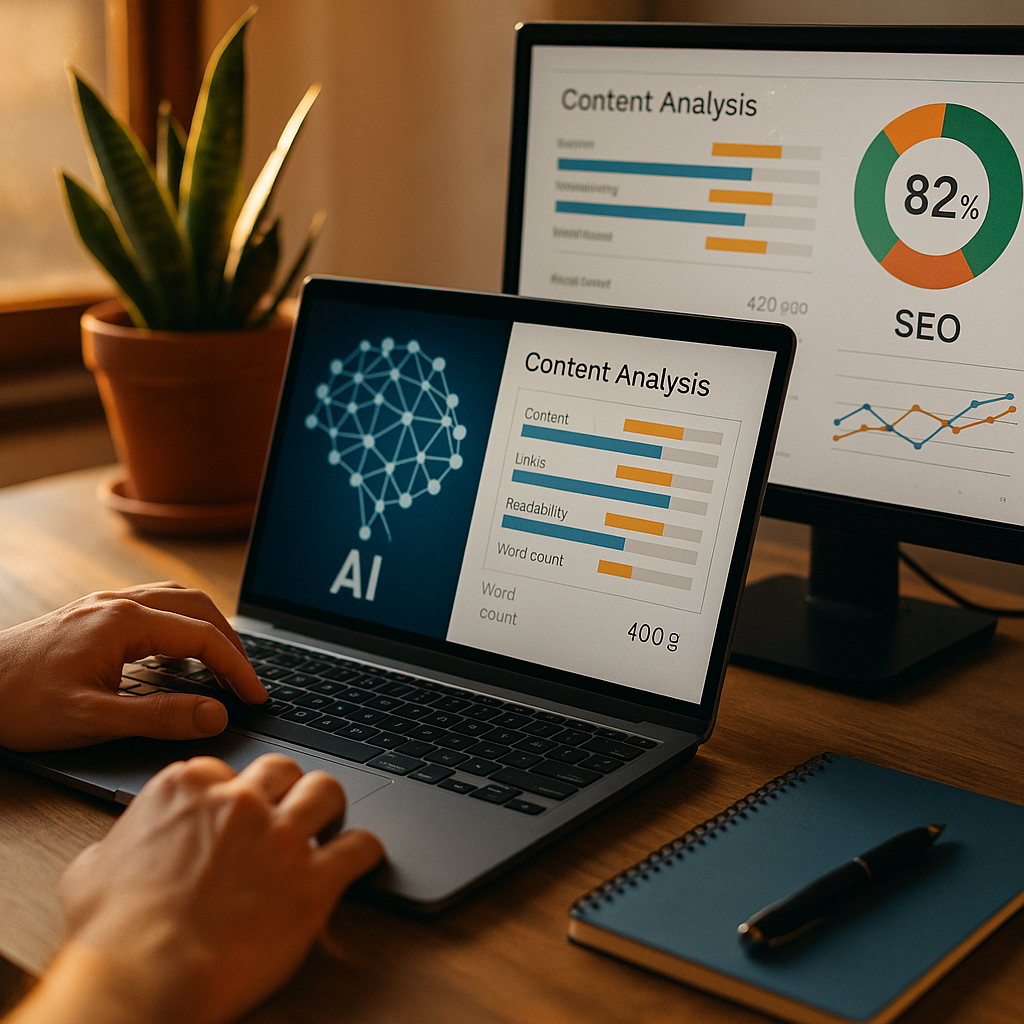Using AI to analyze and score the quality of your website’s content for SEO is no longer just an emerging trend—it’s a critical strategy in 2025. With search engines prioritizing user experience and content depth, leveraging AI ensures your site is both competitive and relevant. Let’s unravel how AI can transform your SEO content strategy today.
Why AI Content Analysis Matters for Modern SEO
As search engine algorithms evolve, they now demand more than just keyword density and backlinks. The focus has shifted toward content relevancy, credibility, and user intent. AI content analysis tools can quickly evaluate these factors by:
- Identifying gaps and redundancies in your content
- Detecting keyword opportunities missed by manual audits
- Assessing whether your material matches user search intent
A survey by Search Engine Journal in early 2025 found that websites integrating AI-powered content audits saw an average 35% boost in organic traffic within six months. Clearly, content quality powered by AI analysis is now indispensable.
How AI Content Scoring Works: Behind the Algorithms
The AI content scoring process blends natural language processing (NLP), machine learning, and big data. Here’s how it typically works:
- Crawling and Extraction: AI tools scan your website’s content, metadata, internal links, and structural elements.
- Assessment with Algorithms: Advanced NLP models evaluate language use, topical coverage, factual accuracy, and EEAT (Experience, Expertise, Authoritativeness, and Trustworthiness) signals.
- Comparison to Benchmarks: Your site’s content is measured against industry standards, top-performing competitors, and search intent profiles.
- Generating Scores: The AI assigns a quality score—often segmented by factors such as readability, authority, topic depth, and engagement predictors.
This automated scoring saves time, eliminates subjective biases, and uncovers opportunities for strategic improvements.
Key AI Tools for Website Content Quality Assessment
Integrating the right AI SEO tools into your workflow is essential. In 2025, the most impactful platforms offer:
- Detailed EEAT scoring and recommendations
- Automated competitor content gap analysis
- Smart keyword intent mapping and topic clustering
- On-page optimization tips powered by live SERP data
Some leading options include Surfer SEO, Clearscope, and ContentHarmony. Enterprise teams might use custom AI models leveraging Google’s Natural Language API or OpenAI’s GPT-4 Turbo, coupled with in-house training on brand voice and topic expertise.
Pro tip: Select tools that integrate seamlessly with your CMS and can schedule regular audits to keep your content fresh and competitive.
Boosting EEAT: Practical Steps Using AI Insights
Demonstrating EEAT in your website content is essential for both rankings and user trust. AI-driven analysis enables you to:
- Pinpoint sections lacking authoritative references or expert opinions
- Identify areas where personal experience can boost authenticity (for example, product reviews or case studies)
- Highlight missing credentials for your authors or insufficient transparency in your About page
By following the AI’s suggestions, you can enrich your content with original insights, cite credible sources, and display contributor expertise. This not only satisfies Google’s quality guidelines but also persuades users to trust—and engage with—your content.
Best Practices for Implementing AI-Powered Content Audits
To maximize results, your AI content audit must be consistent and strategic. Follow these best practices:
- Audit Regularly: Set up AI-driven scans monthly or quarterly to catch issues early and adapt to changing ranking factors.
- Prioritize High-Impact Pages: Begin with landing pages, blog posts with declining traffic, and top-selling product pages.
- Review Actionable Recommendations: Focus on fixes that align with both user intent and business goals—such as improving readability or updating outdated statistics.
- Track Performance Impact: Measure rankings, traffic, dwell time, and conversions before and after implementing AI recommendations.
Remember: AI complements deep human expertise. Use its data-driven audits alongside editorial judgment to maintain brand authenticity and audience connection.
Content Quality Scoring: Metrics That Matter in 2025
What should you actually measure? The key website content quality metrics in 2025 include:
- EEAT Score: Aggregates your site’s authority, transparency, and subject expertise
- Relevance Index: Measures how well your content matches the latest search intent and topic trends
- Readability: Considers Flesch-Kincaid scores and accessibility standards
- Engagement Predictors: Analyzes user interaction signals like average session duration and bounce rate
- Topical Depth: Assesses semantic coverage and comprehensiveness relative to search competitors
Leading AI platforms now provide dashboards that visualize these metrics, helping visualize your site’s strengths and weaknesses at a glance.
Conclusion: AI Is Essential for SEO Content Excellence
AI-powered analysis and scoring are now central to achieving and maintaining effective SEO content in 2025. By leveraging AI-based audits, strategic improvements, and EEAT best practices, you can ensure your website ranks higher and genuinely helps your audience. Start integrating AI—your competitors already are.
FAQs: Using AI to Analyze Website Content Quality
-
How accurate are AI SEO content scoring tools?
Most modern AI tools, particularly those updated in 2025, reach over 90% accuracy according to independent reviews. Still, their best results are achieved when paired with human oversight. -
Can AI detect plagiarism or thin content?
Yes, AI analysis can flag duplicate, spun, or low-value content. Many tools integrate anti-plagiarism checks and evaluate for uniqueness and topical depth. -
Will using AI replace the need for human editors?
Not completely. AI automates data analysis and highlights areas for improvement, but human editors ensure context, empathy, and alignment with brand voice. -
How often should I run an AI-powered content audit?
Performing audits at least quarterly is recommended. However, larger or frequently-updated sites might benefit from monthly scans. -
Do AI tools factor in Google’s EEAT guidelines?
Top AI-powered tools in 2025 are specifically built to identify and offer suggestions for improving EEAT signals across your site.
